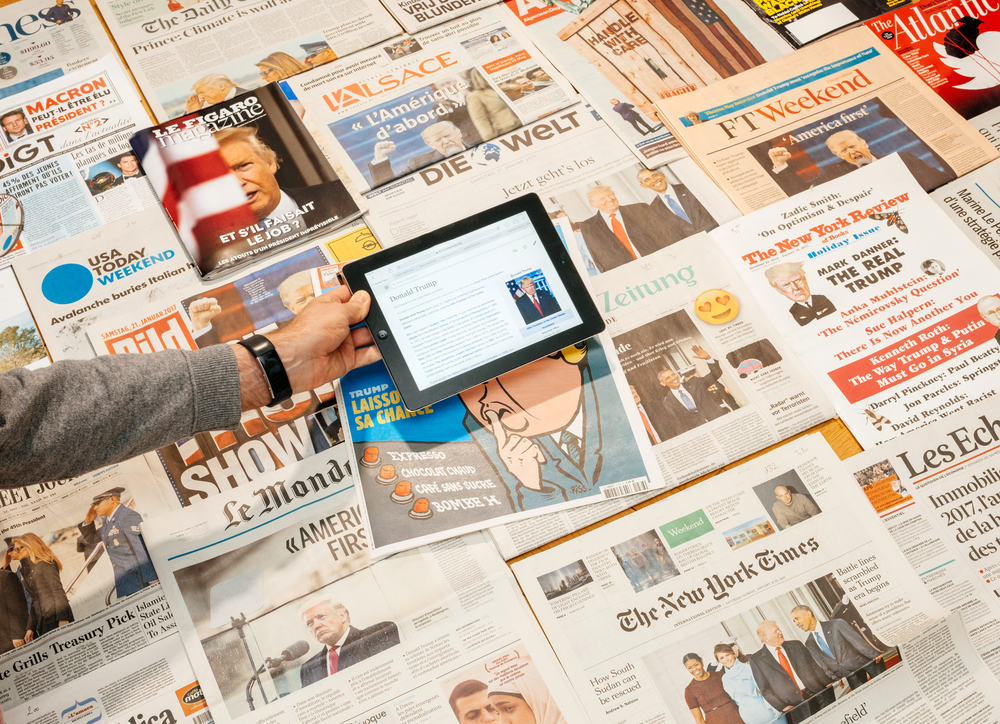
Bogus news reporting is causing genuine social anxiety. Here’s how to self-check the facts and find the genuine article
We’re bombarded with news headlines every day, whether we know it or not. When you browse your social media feeds, check your mobile alerts or click on your favourite bookmarks, you’re potentially exposing yourself to hundreds of developing news stories from around the globe. Hey, it’s a fast-moving world and keeping up to speed has never been more important, right?
Apparently not. A recent YouGov survey suggests the majority of people in the UK can’t tell the difference between real news and fake news. In the States, things are worse, where a new Pew Research Center report suggests that 23 percent of Americans are complicit in the fake news epidemic.

What happened? The news was once a central pillar of British society, but since 2012 the storm clouds of doubt have been gathering. First, we weathered the phone hacking scandal, then came the Scottish referendum, and finally the rumbling thunder of Brexit. Late last year, the motherlode arrived in the guise of the US presidential elections – ‘alternative facts’ became the new news.
To crown it, none other than the new leader of the free world, Donald Trump, pushed the internal media discussion of bogus news into the mainstream at his very first press conference as President-elect, when he accused one of the world’s largest and most respected news organisations, CNN, of being ‘fake’. Suddenly, the entire media industry was accused of being the public enemy.
Remember that media spat about Trump’s inauguration crowd size? Or whether it rained or not? And while we’re on the weather, why is climate change now being labelled a ‘hoax’? The news headlines are becoming ever more ridiculous, such as that story about the dead gorilla receiving 15,000 votes in the US election (it didn’t).
In the UK, we didn’t do much better. There were dodgy numbers painted on Brexit buses, immigrants on posters, redesigned Toblerone-inspired non-invasions of Switzerland, and ‘scare-tactics’ at every turn. And to think, we have a UK general election and a France presidential election right around the corner. It’s thoroughly depressing. So what can be done in these days of post-truth?
Just as you take what you eat seriously, so you should take what you read seriously
Well, while there’s no doubt the news is important and bogus untruths offend us all, it’s worth remembering that today’s news is tomorrow’s chip wrapper. News changes fast and what’s big today might well not seem so big tomorrow, so we should remember to keep a healthy perspective. Thankfully, news is rarely actually life-threatening. Similarly, we must be aware that reposting or sharing fake news can cause offence.
Next, it’s worth recognising that although 'The Donald' dropped the fake news bomb into the mainstream, the idea of ‘fake news’ has been around for as long as news itself. So why the big brouhaha now? That’ll be the internet and the way it has massively ramped-up the way it breaks developing news. Newspapers are, like, so yesterday, right?
Where once there was a professionally trained human editor person vociferously scrutinising each and every fact, now we have cut and paste, post and share, and Adobe Photoshop - beautifully simple but potentially lethal for modern democracy. This is why it’s incumbent on us all to differentiate between real and fake news, demanding the former and completely ignoring the latter.
There’s no doubt the news is important and bogus untruths offend us all, it’s worth remembering that today’s news is tomorrow’s chip wrapper
So how do we make this happen? Firstly, as you scroll through your newsfeed, turn on the slightly more sceptical and pedantic side of your brain. Query and question the source material, and the source itself. Where is your news coming from? If it’s a news site you’ve never heard of, then deafening alarms bells should ring out – it could quite conceivably be a teenager with a chip on his shoulder and a talent for desktop publishing. The source is crucial and even the sources within the source.
If anything about a story smells fishy, trust your instinct: it probably is fishy. Check the dateline –viral fake news stories get recycled – and don’t waste energy getting angry about something that may or may not have happened three years ago. Real news has a sell-by date and it’s usually less than a week. As for the major media companies, stick to the biggies while accepting they have their biases – BBC, CNN, The Times, and so on. They haven’t got to where they are today for nothing, and each has its own ‘fake news department’ to fact-check their coverage. They are also largely accurate, contrary to what Trump believes.

In truth, the biggest purveyor of fake news is the world-crushing duopoly of Google and Facebook. Increasingly, we all get a chunk of our daily news from Facebook. This intrusive blue friend has been the recipient of much fakery-related criticism of late. If you have doubts as to the veracity of a story or article on Facebook’s newsfeed, do the world a favour and simply report the post by selecting “I don’t think it should be on Facebook” and then tagging it as a “false news story” thereby greatly reducing its traction within those all-pervasive logarithms. Facebook is working to rid itself of fake news by ensuring its trending stories are ranked according to the number of organisations covering the story rather than the number of individuals sharing it. This is sure to help. We’re still waiting to hear back from Google – they never share their secrets – but both Facebook and Google are currently investing squillions on fact-checking services to overcome the fake news phenomena, so fair play to them.
The world is changing fast, and so is the way we find out about it. It’s important to keep calm, rational and curious. Just as you take what you eat seriously, so you should take what you read seriously. Don’t believe any old garbage because you read it on some news aggregator online. Instead, set an example by checking the news before you share it. The truth is out there.
Photography: Hadrian / Shutterstock.com

